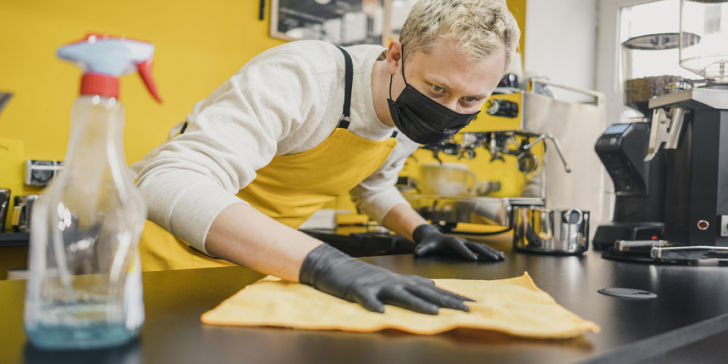
Restaurant cleaning services Columbia MO provides a valuable service that helps keep restaurants clean and safe. A regular cleaning and sanitizing schedule can prevent the spread of germs and viruses that could make customers sick.
Kitchen exhaust hoods must be cleaned regularly per NFPA Code 96 guidelines to avoid fires. They must be sanitized and deep cleaned to eliminate grease buildup. Other essential tasks include emptying and cleaning keg lines and soda and coffee machines.
Preparation
Before you hire a restaurant cleaning services Columbia MO, make sure that you understand what areas you want to have cleaned. You may not need to have the entire restaurant professionally cleaned; you might only need the back or front of the house. Knowing your needs will help you narrow your search for professionals and save money.
First, prepare the area to be cleaned by putting away or covering food items and removing floor mats. Next, wipe down windows and other glass surfaces. Lastly, wash and clean all display cases. Remember to use food-safe cleaners in these areas.
Another essential task is emptying, cleaning, and flushing keg lines and soda or coffee machines. This is especially important as grease can build up and clog city sewage systems. Last, cleaning and disinfecting drains frequently is essential to prevent clogs. This is a task that many restaurants need to remember to do. It’s also good to wipe down toilets and restock paper towels, soap dispensers, and sanitary napkin receptacles.
Equipment
Restaurant cleaning services Columbia MO should have the proper equipment to clean the entire restaurant. This includes a broom, dustpan, mop, scrub brush, metal sponges, spray bottles, and disinfectants. A professional cleaner will also have a high-powered vacuum for the restaurant’s floor. They will also have a safe cleaning solution for food preparation areas and can be used on all surfaces.
The kitchen exhaust hood system must be cleaned to protect it from fires. When cooking, the fan pulls up flammable grease vapors that can start a fire if not properly cleaned. The hood cleaning must be done by a trained, qualified, and certified entity per the NFPA codes.
Another crucial area is the restrooms, where customers enter and exit. They must be sanitized and wiped down multiple times daily. In addition, trash cans and sanitary napkin receptacles should be empty and emptied regularly.
Cleaning Supplies
Restaurants need various cleaning supplies, including brooms and dustpans, buckets of hot, soapy water, sponges, metal scrubbers, spray bottles, and disinfectants. A good restaurant cleaner also knows how to use these tools and techniques efficiently.
Kitchens must be cleaned and sanitized, including hoods, vents, filters, and fans. Grease accumulates and can clog drains, so restaurants need to clean grease traps regularly. Restaurants should also clean walls, wipe down sinks and faucets, and remove and wash floor mats.
Restrooms are another high-priority area and must be sanitized and deodorized multiple times daily. This includes scrubbing floors, wiping down sinks and toilet fixtures, emptying trash cans, and keeping toilet paper and sanitary napkin receptacles stocked.
Other items that must be regularly cleaned and sanitized include keg and soda lines, coffee, tea, water dispensers, and glass window surfaces. It is also essential to wipe down display cases and keep food fresh. In addition, restaurants should regularly empty and flush the drains to prevent them from getting clogged.
Safety
Restaurants must be clean and sanitary for the safety of their employees and customers. It is essential to disinfect surfaces that come into contact with food, such as door handles and sink faucets. Also, be sure to wipe down windows and food display cases. It is also necessary to wipe down floors throughout the day to remove moisture and grime.
The most important area to clean is the kitchen. Cooking generates grease vapors that can cause fires if not removed promptly. It is also essential to clean exhaust hoods regularly. These systems must be cleaned by a qualified and certified entity according to NFPA Code 96 standards. Fire marshals and city and state fire inspectors are in charge of enforcing this.
Other areas that need to be cleaned include the restrooms. It is essential to sanitize and restock all supplies, including soap dispensers, hand dryers, paper towel holders, and sanitary napkin receptacles. It is also necessary to empty and clean keg lines, soda, and coffee machines. Finally, restaurants should regularly clean their drains to prevent clogging and odor issues.
